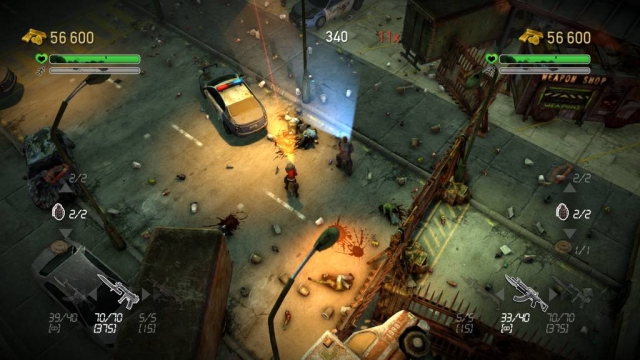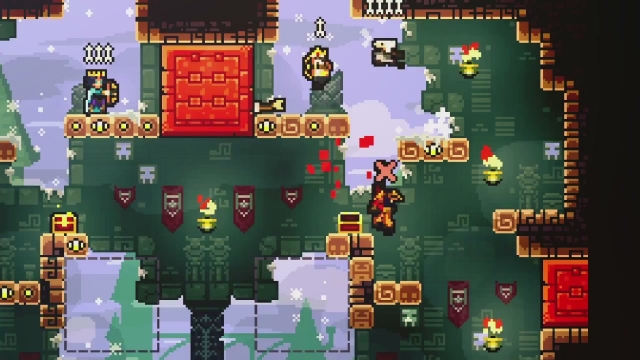
Sofa Sharers: An Interview With Housemarque
Welcome to the fifth edition of Sofa Sharers. We’ve got a special treat lined up this week in the form of an interview with independent Finnish developers Housemarque. One of the best ‘small but hugely successful’ studios out there, Housemarque are world famous for the Super Stardust series as well as the excellent PS4 launch title Resogun. They’re also creators of the local co-op championing zombie shooter Dead Nation, originally a PS3 title that was recently repackaged and relaunched on PS4. In fact, if you’re signed up for PS+, you can get that most recent version of the game for free. Housemarque have released some brilliant games featuring local co-op, so we asked them some questions regarding split-screen gaming.
GG: Do you consider local co-op (that is, playing alongside someone on the same console) to be an important part of your games? If so, why?
HM: At the moment of writing Resogun doesn't have any local co-op, for several reasons, most importantly because with the tight deadline of PS4 launch games we didn't have enough time to figure out a way to make it work properly, given that levels are cylindrical and in online co-op players can play on whichever side they choose. That said, we know it's a highly requested feature. Dead Nation has it both on the original PS3 game and now on the recent PS4 port by Climax Studios, so that's an indication of awareness in that direction. We just want to make sure it makes sense and it works as it is supposed to before including it.

GG: Do you think that local co-op support can improve any game on the market?
HM: No. Some kinds of games are more suitable than others, and among the two I would argue that online co-op is more important. Looking at the numbers, it's easier for most players to play with friends online than invite them over all the time. Also, local co-op comes with collaterals, meaning that you need to have extra game pads (and chips, and beers ^__^). Not everybody can afford that. That said, request for the feature has been massive, so we're looking into it.
GG: It’s difficult to deny that local co-op, as a mechanic, has been in decline over the last 10 years. How do you feel about this?
HM: I guess the answer depends on whom you ask. Average player age is on the rise, and while it's probably easier to play in the same room when you're at college, it becomes more complicated when all your friends are over 35 and they all have kids. This doesn't mean we don't want to support local co-op, on the contrary we've often been playing stuff like Samurai Gunn or even Smash Bros here at the office. But ours is a peculiar situation: a lot of gamers and a lot of hardware under the same roof. I think a combination of the two is the best option, different players have different needs.
GG: Are there any technical limitations that modern developers have to face in order to support local co-op?
HM: No I wouldn't say technical, no. It's more asking yourself the question: "Does local co-op make sense for this game? Is the gameplay still readable? Can people still understand what's going on if we use a split-screen?". At least, for Resogun that has been a major concern, at the highest difficulty levels there's no way to play it well with a split-screen.

GG: Is there any chance of a full resurgence of local co-op support moving forward?
HM: It won't go away anytime soon. Games like Samurai Gunn and Towerfall center around local co-op, but we have to acknowledge that a huge slice of the audience is fine playing online.
GG: Will you be looking to continue local co-op support in your games?
HM: If it makes sense for the type of game we are making, definitely yes.
The replies from Housemarque are intriguing. With Sofa Sharers now in its fifth edition, it’s great to see the developer’s side of the story when it comes to local co-op gaming. There are two things in particular that stick out to me. The first is the acceptance and realisation that online gaming is, in this age, a much bigger entity than split-screen. As a rule of thumb, I tend to prefer playing with a friend beside me, but a great point is raised about the physical difficulties of actually managing this. It’s also an excellent point that as the average age of gamers increases, it becomes more difficult for developers to see the need for local co-op. Understandably, those who don’t live very close to their friends (as is often the case in adulthood) are more likely to play online than within the same room.
It’s also fascinating to hear that there aren’t really any technical restrictions on creating local co-op mechanics, at least not for Housemarque. I’ve always been under the impression (based, admittedly, on nothing at all) that split-screen or local co-op took a fair deal of extra time and resources to produce. This may not be the case after all, and while it’s certainly true that split-screen does put a great load on the console/PC, it’s heartening to know that developers aren’t technically restricted.
I’d like to thank Housemarque and their community manager Tommaso De Benetti for the interview. That’s all for this week’s edition of Sofa Sharers; if, like me, you’ve got a passion for split-screen gaming then you can check out any of the previous articles to the side of this page. Sofa Sharers goes live every other Friday, so be sure to check back in two weeks for the newest edition. Let’s not let split-screen die, but help it rise from the ashes like a Phoenix!









COMMENTS